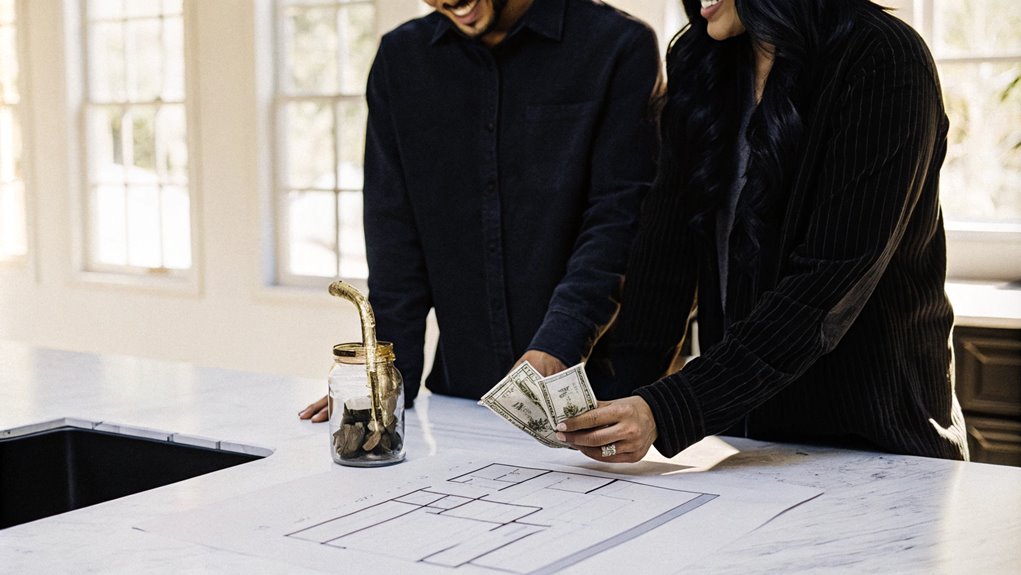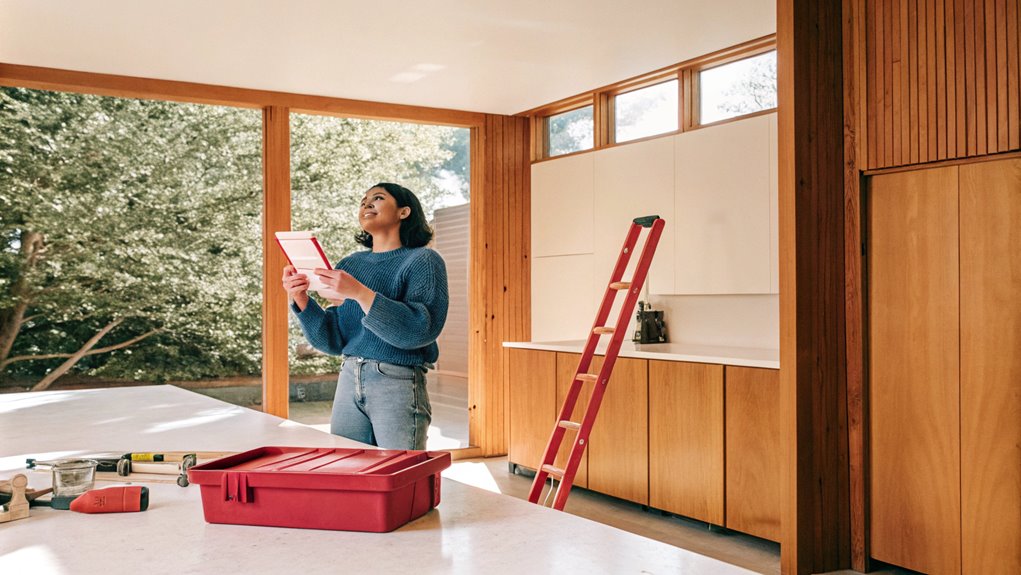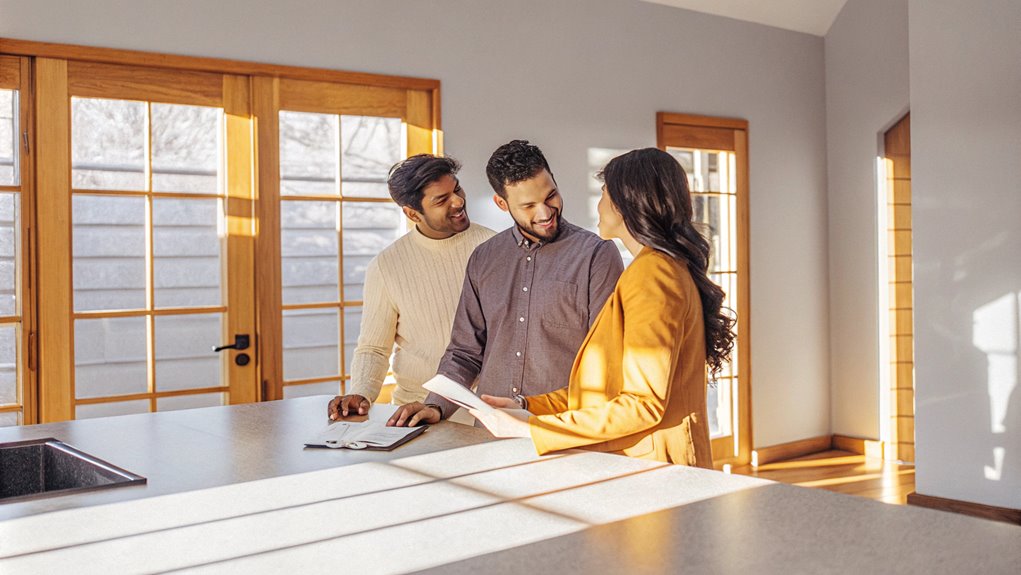When you buy a home, think about all the money you'll need – not just your monthly house payment. A good rule is to spend no more than 30 cents of each dollar you make on your home. Save up enough money to put down at least 20% when you buy. This helps you avoid paying extra fees.
Keep some money saved up for hard times – enough to last 3-6 months. You will need to pay taxes on your home each year. You also need to pay for house insurance to keep your home safe. Don't forget about lights, water, and heat bills each month. Your home will need fixes now and then too.
Look at these costs before you pick a home. This will help you buy a home you can really afford.
Ready to start building equity in your own Michigan home? Get your personalized home loan quote today.
Calculate Your True Housing Budget

Buying a home isn't just about the monthly payment to the bank. You need to think about all the money it takes to own a home.
Let's look at what you need to pay for:
- The bank payment
- Taxes on your house
- Home insurance
- Extra insurance if you put less than 20% down
- Fees if you live in a community
- Power and water bills
- Things that break and need fixing
Think of it like this: Put away $1-2 for every $100 your house is worth each year. This helps you fix things when they break.
Also, look at how much money you make each month. Your house costs should only take about 30 cents of every dollar you earn.
Don't forget to save some extra money just for your house. When big things break, you'll be glad you saved up.
Michigan residents, unlock the door to your new home. Request your home loan quote from Treeside Financial today.
Know Your Debt-to-Income Ratio
Let's Talk About Your Money and Bills
You need to know if you can afford your dream home. To do this, look at how much of your money goes to paying bills each month.
This is called your debt-to-income ratio, or DTI. To find your DTI, add up all the money you pay for bills each month. Then divide it by how much money you make before taxes.
Most banks want to see that your bills take up less than 43% of your monthly pay. This includes what you'd pay for your new house.
How Your DTI Affects You:
- If your DTI is under 36%: You're in great shape to buy
- If your DTI is 37-43%: You might want to pay off some bills first
- If your DTI is over 43%: Work on paying down your bills before looking at homes
If too much of your money goes to bills, pay some of them off first. This will help you get a home loan and make sure you can still afford fun things after buying your house.
Save for a Larger Down Payment

Making a bigger down payment helps you pay less each month for your home. When you pay 20% or more upfront, you save money. You won't need extra insurance, and you'll get better rates on your loan.
To save more money for your down payment, set up a special bank account. Put some money from each paycheck into it. Skip eating out and shopping for a while. Use any extra money you get, like tax refunds or work bonuses, to grow your savings.
Some programs can help first-time buyers with free money or matching funds.
You can buy a home with just a small down payment, but paying more helps you in the long run. A bigger down payment means you own more of your home right away. It also keeps you safer if home prices go down.
Factor in Hidden Homeownership Costs
Buying your first home can be exciting, but you need to think about more than just the monthly mortgage. Other costs can sneak up on you if you aren't ready.
Here are the main costs you'll have to pay:
- Property Tax – You pay 1-3% of your home's worth each year
- Home Insurance – You pay $800-2000 each year
- Power, Water, Gas – You pay $200-400 each month
- Home Upkeep – You pay 1-4% of your home's worth each year
- HOA Fees – Some homes need $200-400 each month
You also need money saved for when things break. Put away 1% of what your home is worth each year. This helps when you need to fix big things.
Don't forget about:
- Yard work
- Bug control
- House cleaning
These extra costs can add up to a lot more money each month. Make sure you count all these costs before you buy a home.
Research Property Tax Rates

When you buy a house, you need to pay property taxes every year. These taxes can cost a lot of money. The amount you pay will depend on where your house is. Even houses in nearby towns might've very different tax bills.
Your property taxes help pay for schools, roads, and things that make your town better. To know how much you might pay, take the tax rate and multiply it by how much your house is worth.
Don't just look at what the old owner paid – your bill could be different.
You can find out the tax rates by calling your town office or looking at their website. Some people pay less in taxes. If you're older or if the house is your main home, you might get a discount.
Ask about these savings when you check the rates.
Shop Different Mortgage Lenders
Looking for a home loan? Talk to three or more banks to find the best deal.
Ask each one how much they charge per year and what rules come with their loans. Get a list from each bank that shows all the costs – like fees for paperwork and other charges.
Make sure to ask about any extra costs they mightn't tell you about at first.
Think of it like shopping for the best price on a big item – you want to check different stores to get the best deal.
Compare Rates and Terms
When you want to buy a home, you need to look at different banks to find the best deal. Talk to at least three banks about their home loans. This helps you save money.
Look at these important things:
- The interest rate you'll pay
- How much money you need up front
- All the costs to get the loan
- How long you'll pay the loan
Get all the prices within two weeks. This way, checking with many banks won't hurt your credit score.
Think about what type of loan you want. Some loans keep the same rate forever. Others can change over time. This affects how much you pay each month.
Ask each bank the same questions. Make sure you know about:
- When they lock in your rate
- If you need extra insurance
- What fees you must pay
Take your time to pick the right loan. A good choice will save you lots of money over time.
Ask About Hidden Fees
When you get a home loan, there are costs you need to know about. These costs are on top of what you pay each month. Think of them as extra fees that can add up fast.
Ask your loan person to show you all the fees on paper. They must give you a form that lists every cost. Look for words like "origination fee," "application fee," and "processing fee."
Talk to your loan person about each fee. Ask if you can pay less or not pay some fees at all. Some fees, like mail costs, can go away if you ask.
Watch out for fees that make you pay more if you pay off your loan early. Also look for extra insurance costs you might need to pay. These can cost you a lot over time.
Talk to many loan people and compare their fees. This will help you find the best deal and save money on your home loan.
Consider Future Income Changes

Think about your job and money plans for the years ahead. Ask yourself: Will your job be safe? Will you make more money later? Can you count on getting raises?
These are big things to think about before you buy a home.
If you want to switch jobs or start your own work, you might make less money for a while. Make sure you can still pay for your home even if your pay drops.
The key is to plan ahead so you can keep up with your house payments no matter what happens with your job.
Job Security Analysis
Your job and money matter a lot when you want to buy a home. Think about how safe your job is and if you'll make more money in the future. Look at how well your company is doing and if your type of work will still be needed.
Ask yourself: Could my job go away? Could another company buy us? Will new tools make my job less needed? Make sure you have skills that other companies want, just in case.
Save some money for hard times. Find out how long it takes people in your field to find new jobs, and save enough to last that long. If your job isn't very stable, look for a cheaper home. This way, you can still pay for it with less money.
Keep learning new things at work. Look for ways to move up. The better you do at work, the easier it will be to pay for your home over many years.
Promotion and Raise Potential
When you think about buying a home, look at how much money you might make in the years ahead. Ask yourself:
Will your job give you a chance to move up?
Do people at your work often get better jobs and more pay?
Is your type of work growing?
Think about ways you can earn more, like taking classes or getting special training. If your job field is doing well, you can plan for making more money later.
But don't buy a house based on money you hope to make.
Make two money plans:
- One plan with what you make right now
- One plan with a small raise each year (about 2-3% more)
This way, you can pick a house price that works for you now and later.
Career Change Implications
Making big job changes can affect if you can pay for your house each month.
Before you buy a home, think about what you want to do in your job. Will you switch to a new job? Start your own work? Move to a new place? All of these can change how much money you make.
Save some extra money before you make big job moves. This way, you can still pay for your house if you earn less for a while. You might need money for new school or training. Or you may be out of work for a bit.
If you want to switch jobs soon, wait to buy your house. Banks like to see that you've made steady money for two years. A new job can make it hard to get a loan later if you need one.
Build an Emergency Housing Fund
Keeping your home safe means having money ready when things go wrong. You need enough saved up to pay for 3-6 months of house bills. This means your home loan, house insurance, and fixing things that break.
First, add up what you pay each month for your house. Then times that by how many months you want to save for. Put some money from each paycheck into a special bank account. Try to save 10% of what you earn until you have enough.
Keep this money separate from your other savings. This way, you won't use it for other things.
Also save extra money just for fixing your house – about 1-2% of what your house is worth each year. When big things break, like your AC or roof, you'll be ready.
Evaluate Neighborhood Growth Potential

When you buy a home, you want to make sure it grows in value over time.
Look at what's new in the area. Are there plans for better roads? Will new stores open soon? Is the school getting fixed up? These things can make homes worth more money.
Watch what's going on in the area. Are new jobs coming? Is the area safe? How good are the schools? Look at how things have changed in the last five years.
Talk to people who sell homes in the area. They know which parts of town are doing well. They can tell you where home prices keep going up.
Look at nice areas nearby too. Good neighborhoods often spread out, making nearby areas better too.
Compare Insurance Costs Beforehand
When you're buying a home, check how much insurance will cost first. Just like houses, insurance prices can be very different. What you pay depends on where the house is and how old it is.
Get prices from three or more insurance companies. Ask them what they cover and how much it costs each month. They can help you find the best deal.
Some homes need extra insurance. If your home is in an area that floods, you'll need flood insurance too.
Your costs might go up over time. This can happen if:
- You make claims
- Your area has more crime
- Bad storms hit your area often
You can save money by getting your car and home insurance from the same company.
Start looking at insurance costs early. Some homes might cost too much to insure, even if you can buy the house. High insurance costs can make it hard to pay your bills each month.
Plan for Home Maintenance Expenses

Your house needs care to stay in good shape. Put aside some money each month for repairs and upkeep. For a $300,000 house, save between $3,000 to $6,000 each year.
Make a special bank account just for your house needs. Use this money to fix things that break and to keep your house running well.
You'll need money for:
- Checking your heating and cooling
- Cleaning gutters
- Getting rid of bugs
- Fixing the roof
- Buying new machines when old ones break
- Taking care of pipes
- Cutting grass
- Moving snow
Set up your bank to move money to this account every month. This makes it easy to pay for big fixes when you need them.
If you skip small fixes now, they can turn into big, costly problems later.
Assess Utility Cost Differences
Look at how much you pay for power, water, and gas in different areas. Some places cost more than others. You can save money by knowing when rates are lower.
Try to use less power when prices are high. Check bills from each month to see what you spend. Ask friends what they pay too.
This helps you pick the best place to live and save money all year.
Compare Local Usage Rates
Knowing how much you pay for power, water, and trash pickup can make a big difference in your bills.
Some places cost a lot more than others – even if they're next door!
Before you choose where to live, check these costs:
- Call the companies that give power, water, gas, and trash pickup to find out what they charge now.
- Ask them what they charged over the past few years to see if costs went up.
- Find out when rates are high and low during the day.
- Look for extra fees they add to bills.
When you know these costs, you can plan better and pick a home that fits your money needs.
Research Monthly Peak Times
Did you know that some times of day cost more for power than others? Most people use lots of power between 4 PM and 9 PM. This makes power bills go up.
Look at your old power bills to see when you use the most power at home. Try to use less power when it costs more. This will help you save money.
You can save by running your washer, dryer, and dishwasher late at night or early in the morning. The power company charges less during these quiet times.
You can check your power use on their website or app. Set up alerts to tell you when power costs more, so you can wait to use big machines.
Avoid Emotional Buying Decisions

When you walk into a home, your heart might skip a beat. It can feel like a perfect match.
But making big choices with your heart alone can hurt your wallet. You need to think with both your head and heart.
To stay on track:
- Know how much you can spend before you look at homes
- Take a day to think it over before you make an offer
- Look at the home report and what other homes sold for
- Take a friend with you who can help you stay clear-headed
Keep Housing Costs Under 30
Your home shouldn't cost more than 30% of the money you make each month before taxes.
Think of it like having 100 dollars – you should spend no more than 30 dollars on your home.
Look up home costs in your area to find good deals.
Remember to count all the costs that come with a home – like power bills, fixing things that break, and fees you may need to pay.
This will help you find a home you can really afford.
Calculate Monthly Payment Maximums
Your Home Payment Guide
Want to know how much home you can afford? Let's keep it simple! Don't spend more than you can handle each month.
Start with your money math:
- Count all the money you make each month.
- Take that number and split it into three parts – one part is for your home.
- Put some money aside for house taxes and house safety plans.
- Save a little bit each month for when things break.
Think of it like a pizza. If you have a whole pizza, you can only use one slice for your home costs. The rest needs to go to other things in life.
A good tip: Try to spend less than your max amount. This way, you'll have extra money for fun things or saving up. If you do use the full slice for your home, make sure you don't owe too much money to others.
Remember: It's better to have a home you can easily pay for than one that makes you worry about money.
Compare Local Market Rates
Looking at home prices in your area helps you get a good deal. Check what homes cost in different parts of town before you buy. This helps you avoid paying too much.
Look at these prices in different areas:
| Area Type | Avg Price/Sq Ft | Time on Market |
|---|---|---|
| Urban Core | $325 | 15 days |
| Suburbs | $275 | 25 days |
| Rural | $195 | 45 days |
| New Dev | $350 | 10 days |
Look at homes near where you want to live. Think about schools, safety, and new building plans. These things change how much a home is worth. Watch what sellers ask for and what buyers pay. This helps you know when you can ask for a lower price.
Track All Housing Expenses
Your home costs more than just the monthly payment to the bank.
Let's look at all the money you need to spend on your home to stay on track.
You need to pay for:
- Your monthly bank payment
- House taxes
- Home safety plans
- Group fees if you have them
- Extra fees if you put less than 20% down
You also pay for:
- Power
- Water
- Heat
- The web
- Trash pickup
- Home alarms
Don't forget about:
- Small fixes
- Yard work
- Bug control
- Things you do each season
Keep money saved for big problems:
- Roof work
- Heat and air fixes
- Pipe problems
- Other big repairs
Count all these costs each month.
They shouldn't be more than 30% of the money you take home from work.
When you know what you really spend, you can make sure you have enough money left for other things in life.
Negotiate Purchase Price Strategically

When you buy a home, you want to pay a good price. This helps you save money now and later. Look at what other homes sold for nearby. Also check how long the house has been for sale. Houses that sit for a long time may cost less.
| What to Look At | Why It Helps | What to Do |
|---|---|---|
| Time for Sale | More room to talk price | Look for 90+ days |
| Time of Year | Better deals | Buy in winter |
| House Problems | Lower price | Ask for fixes |
Know how much you can spend before you make an offer. Think about what you'll need to fix in the house too. Every dollar you save on the price means you pay less each month.
When you talk about price:
- Look at other house prices
- Check if the seller needs to sell fast
- Ask about things that need fixing
- Know your money limits
- Make a fair offer







